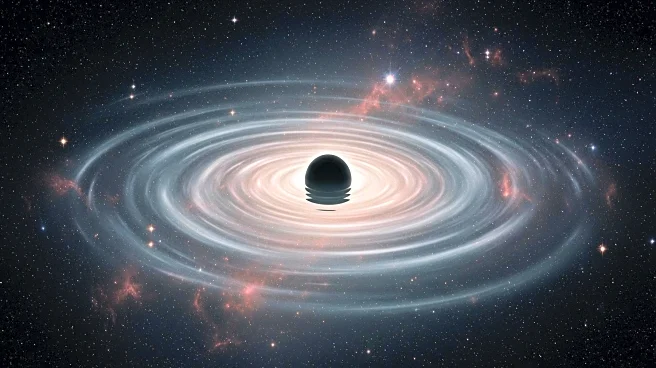What's Happening?
Recent findings from the Dark Energy Spectroscopic Instrument (DESI) suggest that black holes might be responsible for generating dark energy by consuming stellar matter. This hypothesis, known as the cosmologically coupled black hole (CCBH) model, proposes that black holes act as reservoirs of dark energy, potentially explaining the accelerated expansion of the universe. The study, published in Physical Review Letters, indicates that dark energy's role in cosmic evolution may vary over time, challenging the long-held belief that it remains constant. The research was conducted at the Kitt Peak National Observatory in Arizona, where DESI scans the universe with 5,000 robotic eyes, charting millions of galaxies. The study also explores the relationship between dark energy production and star formation rates, using data from telescopes like the Hubble and James Webb Space Telescopes.
Why It's Important?
This research could significantly alter our understanding of the universe's expansion and the role of dark energy. If black holes indeed convert stellar matter into dark energy, it would provide a new perspective on cosmic evolution and the universe's matter content. The findings also have implications for neutrino mass measurements, aligning with current scientific understanding and resolving previous inconsistencies. This could lead to a paradigm shift in cosmology, influencing future research and theoretical models. The study's implications extend to the broader scientific community, offering a new framework to test against existing cosmological data.
What's Next?
Further research and data collection are necessary to validate the CCBH hypothesis. The DESI collaboration, involving over 900 scientists from more than 70 institutions, will continue to analyze data to test this model. As new data emerges, the hypothesis could either be strengthened or ruled out. The scientific community will likely engage in rigorous scrutiny and debate, exploring the hypothesis's viability and its potential to become a new standard in cosmological theory.
Beyond the Headlines
The CCBH hypothesis challenges traditional views of black holes as destructive singularities, instead proposing them as sources of dark energy. This idea could reshape our understanding of the universe's fundamental forces and the interplay between matter and energy. The research also highlights the importance of interdisciplinary collaboration in advancing scientific knowledge, as demonstrated by the diverse team involved in the DESI project.










